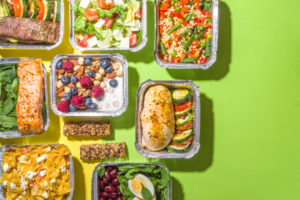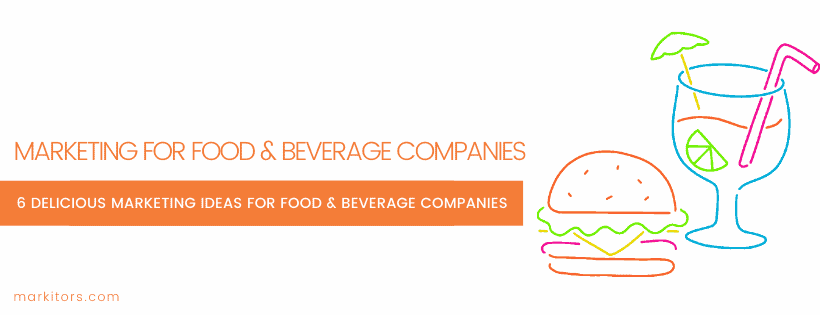
If you want to gain a competitive advantage in an industry so thoroughly dominated by giants, paying for advertising isn’t going to do it. You can’t compete with unfathomably large marketing budgets.
Thankfully, there are plenty of marketing options out there so your food or beverage business doesn’t have to compete directly with the likes of Coca-Cola. From social media to SEO, we’ll go through organic ways to get your brand name out there and increase sales.
- Understanding the competitive landscape in food & beverage
- Differentiate your brand
- Use social media influencers to boost your social media presence
- Connect with food and beverage bloggers to spread the word about your product
- Get published in online publications to improve your backlink profile
- Use free SEO tools from Google to improve your online presence
- Start content marketing with a blog to bring in organic traffic
How competitive is marketing in the food & beverage industry?
Marketing a new food & beverage company can be a challenge. It’s not that you don’t have a lot of marketing options, rather it’s that industry competition from big spenders makes standing out from the crowd nearly impossible.
Take the soft drink industry, for example. If you’re looking to start a soft drink company, you probably know that Coca-Cola, Pepsi-Cola, and Dr. Pepper-Snapple (now Keurig Dr. Pepper) have dominated the US market for years. In fact, the big three have steadily controlled over 80% of total industry revenue for over a decade and continue to do so, with the total market share not changing much since 2013.
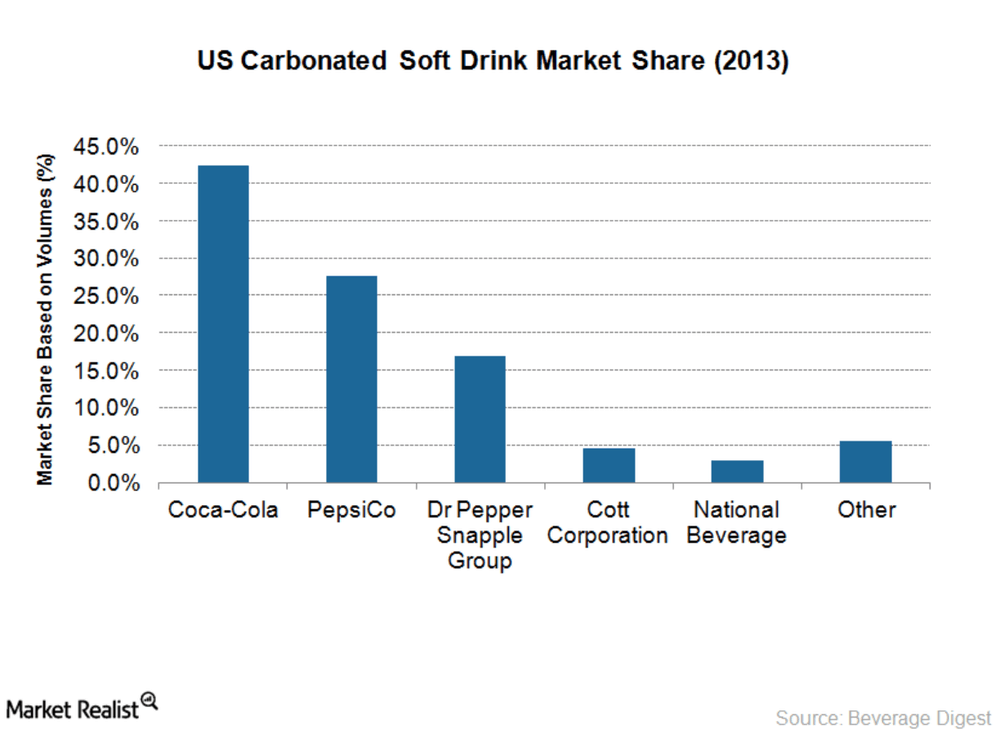 Source: Market Realist
Source: Market Realist
Instead of advertising, focusing on inbound marketing tactics that have customers coming to you helps gain visibility in an industry so focused on brand recognition. Inbound marketing includes content creation for blogs and social media, which rely on customers searching queries to find a brand or product they want.
1. Differentiate your brand
If you’re looking to replicate the success of disruptive food companies like Beyond Meat, you’ll need to differentiate your brand in a crowded market.
There are so many unique ways to do that, but step one is always understanding your customers and their needs.
From there, you can brainstorm a few ideas on how to differentiate your brand. One of the best ways to get started is by looking at what other thriving companies have done to find success.
“What makes it weird?”
Being weird hasn’t always been a good thing, but these days it’s necessary for new food and beverage companies. Starting a business that’s a little weird and a little misunderstood is not a bad thing anymore.
In fact, when you look at companies pushing products like Soylent, Nitro Brew Coffee, and Awake Elixir Herbal Supplement—and making millions doing it—you realize all food and beverage startups need to be a little weird to find success.
Example business: Zico Coconut Water
When Zico Coconut Water was founded back in 2004, coconut water sales in the US were nearly non-existent.
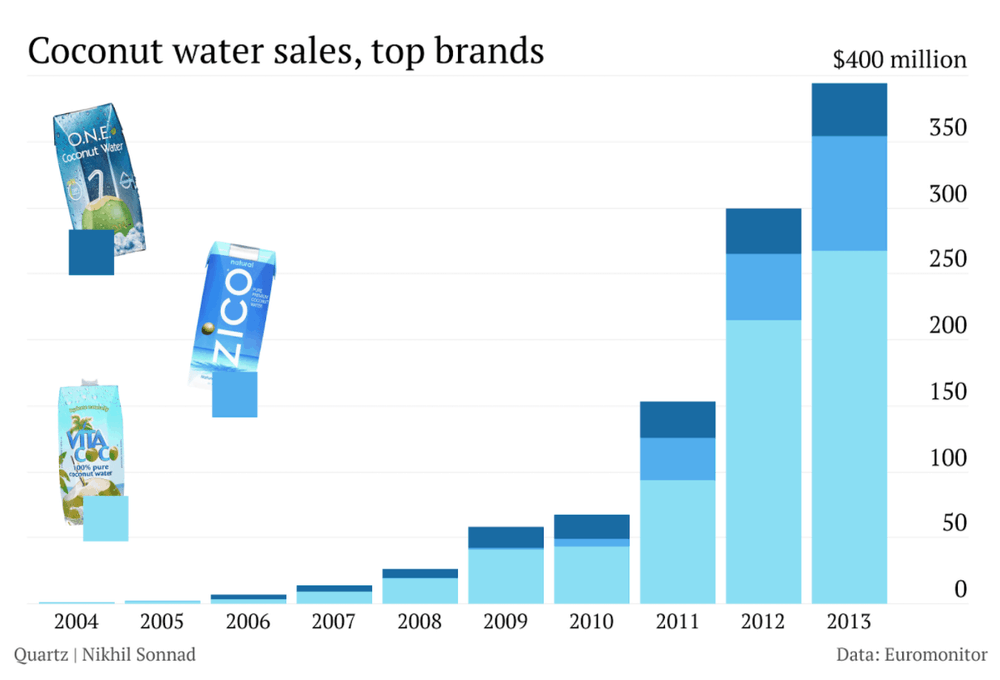
Coconut water wasn’t on most people’s radar back then and many told the Zico brand that it was too weird tasting for the American market. In fact, Justin Woolverton, the president of Big Geyser, a major NYC beverage distributor, admitted recently when he first tried Zico Coconut Water he “didn’t get it” and “thought it was disgusting.”
In 2019, coconut water sales in the United States topped $1.9 billion. So, don’t be afraid to have a brand that’s a little weird.
A unique, consistent marketing strategy
What if your business is unique, but you still can’t differentiate your brand? Well, you can always change your marketing tactics.
Example business: Whole Foods
Whole Foods wasn’t the only grocer around promoting a cleaner, greener, more environmentally conscious lifestyle. What they did well was use unique marketing tactics to make their brand stand out.
Whole Foods runs multiple blogs, has a downloadable app with ‘green’ waste reduction features, and hosts events to support their green initiatives. Not to mention, they partner with shows like Top Chef. It was this consistency and big marketing spend that allowed the company to become what it is today.
From setting ‘green’ trends in the industry by getting rid of plastic bags in 2008 to focusing on fewer stores with higher quality to take away the chain feeling, everything Whole Foods has done was designed to establish it’s high-end, ‘green’ brand.
2. Use influencers to boost your social media presence
Using social media influencers to increase your follower count and engagement is a tried and true tactic. There’s a reason why there are so many influencers posting pictures of their food—they’re getting paid to.
For example, this vegan food influencer posts delicious eye-candy creations and has garnered over 220K followers on her Instagram. Reaching an audience of that size, that has a niche (but growing) interest like Veganism, can help boost your brand awareness and improve your social media presence (not to mention the sales!).
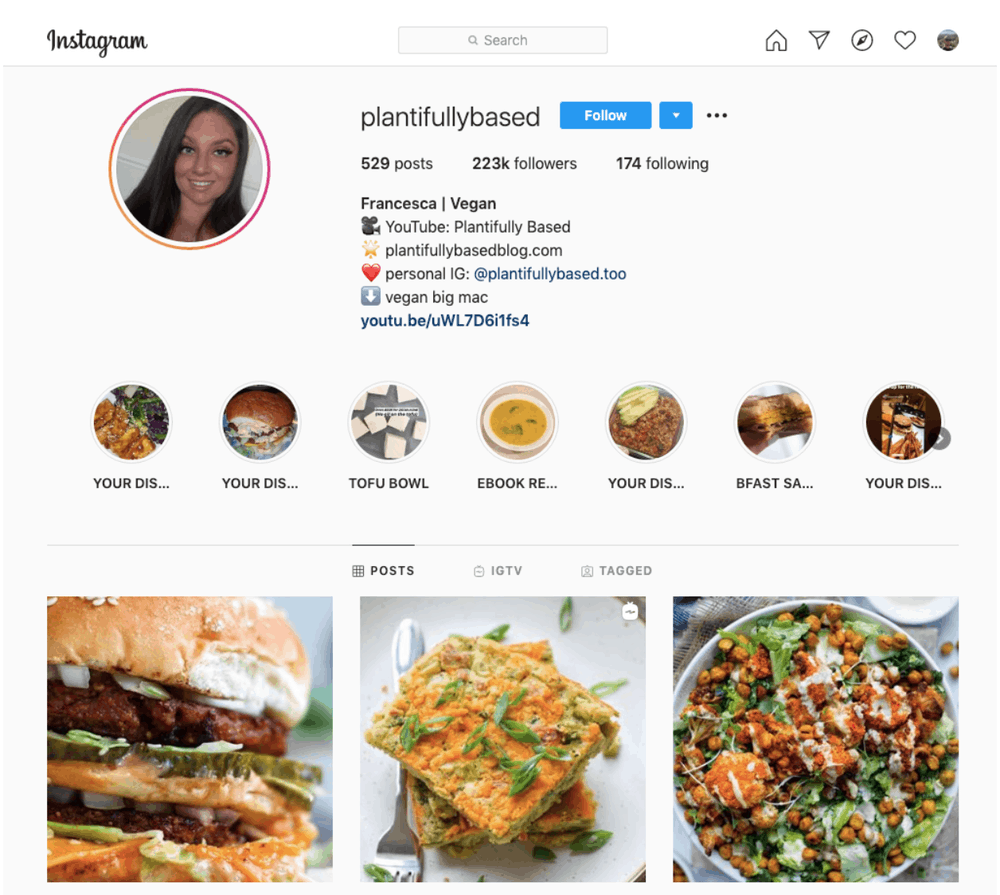
Don’t take our word for it, though. Silk, one of the largest alternative milk producers on the planet, partnered with Francesa, the influencer behind @plantifullybased, to create this post about their vegan cream.
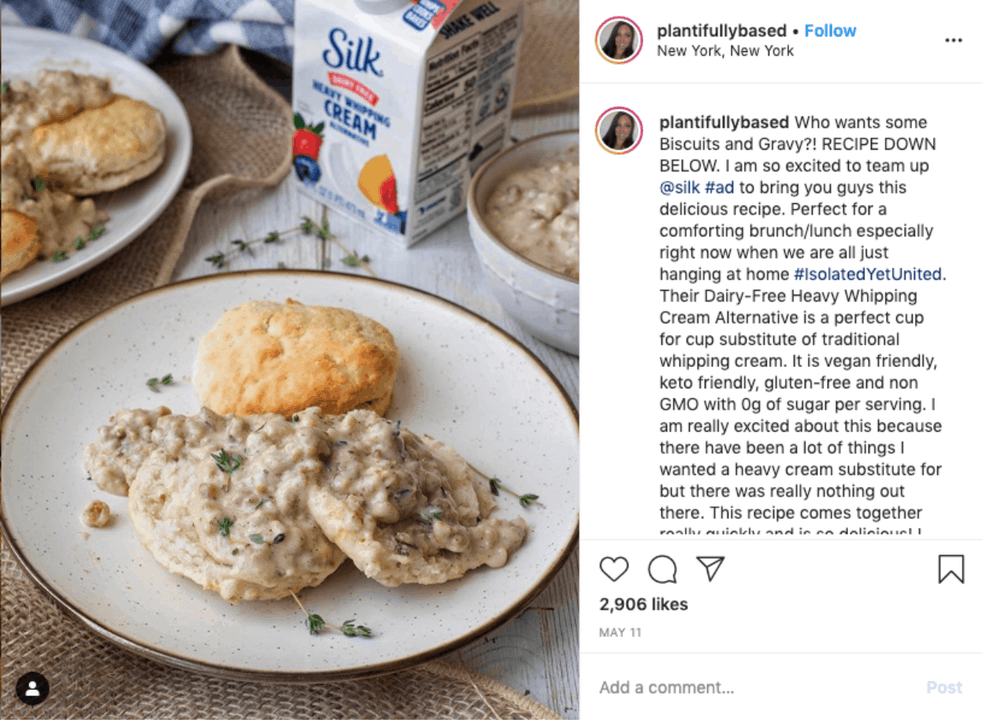
The post has garnered almost 3,000 likes, reaching thousands more. If you want to target a specific audience and grow your social media profile, hiring influencers like Francesa of @plantifullybased to support your product is a great way to get started.
3. Connect with food and beverage bloggers to spread the word about your product
If working with social media influencers goes well, you could also try reaching out to a few food or beverage bloggers or reviewers. Offering free samples alone can often lead to a review. Or, you can work in tandem with these bloggers to be featured on sites with high traffic like this one called ‘A Beautiful Plate’.
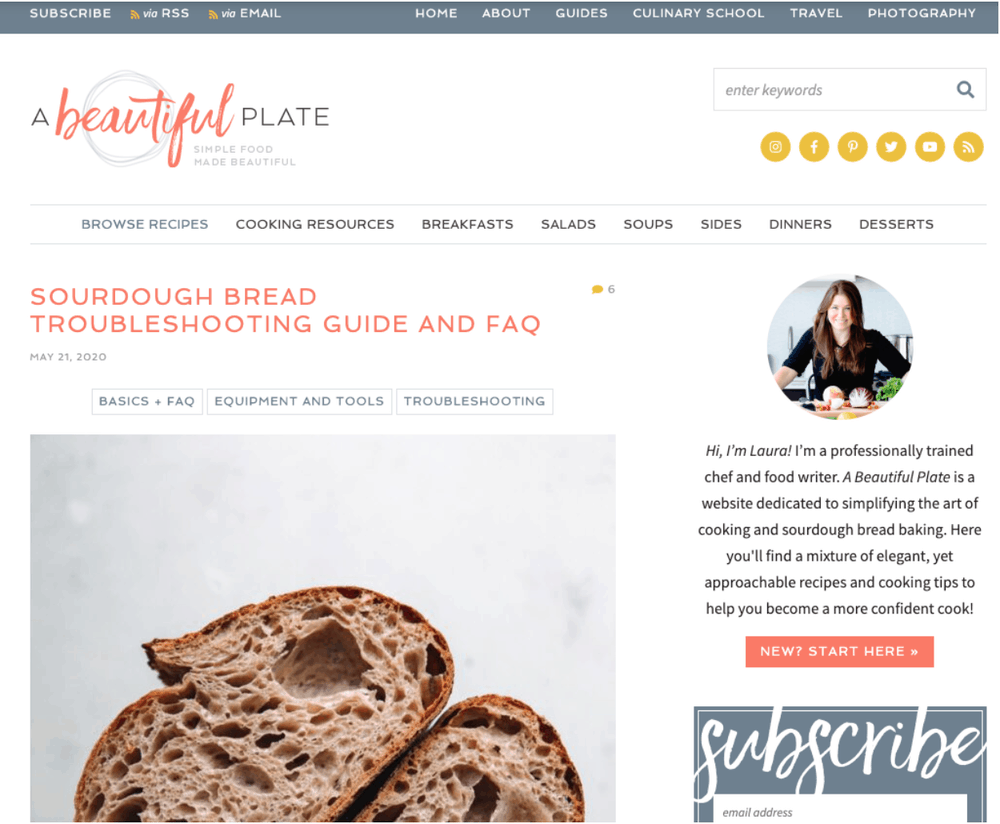
Laura at ‘A Beautiful Plate’ produces thoughtful recipes, food industry articles, and more. And she regularly works with sponsors like in this 2019 recipe post about a Guacamole Greens Salad.
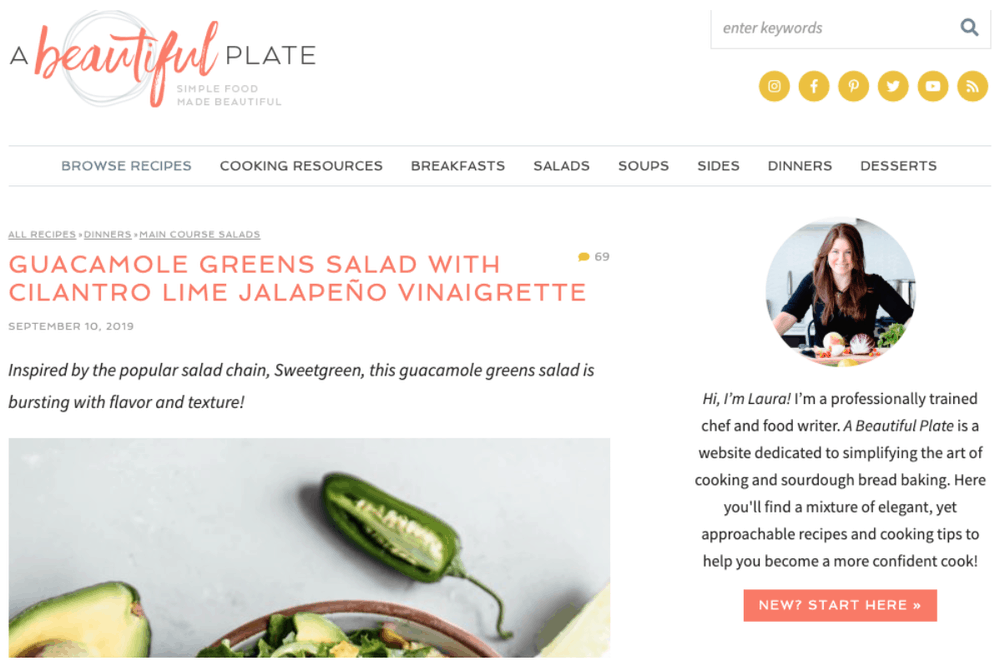
The article appears to be the same as any other blog on her site, and it is, except that it contains a sponsored link to one of her affiliates, Vitamix.
Vitamix, a blender company, sponsored this post so that they can reach a specific audience who enjoys cooking and also may be looking for a premium food processor or blender.
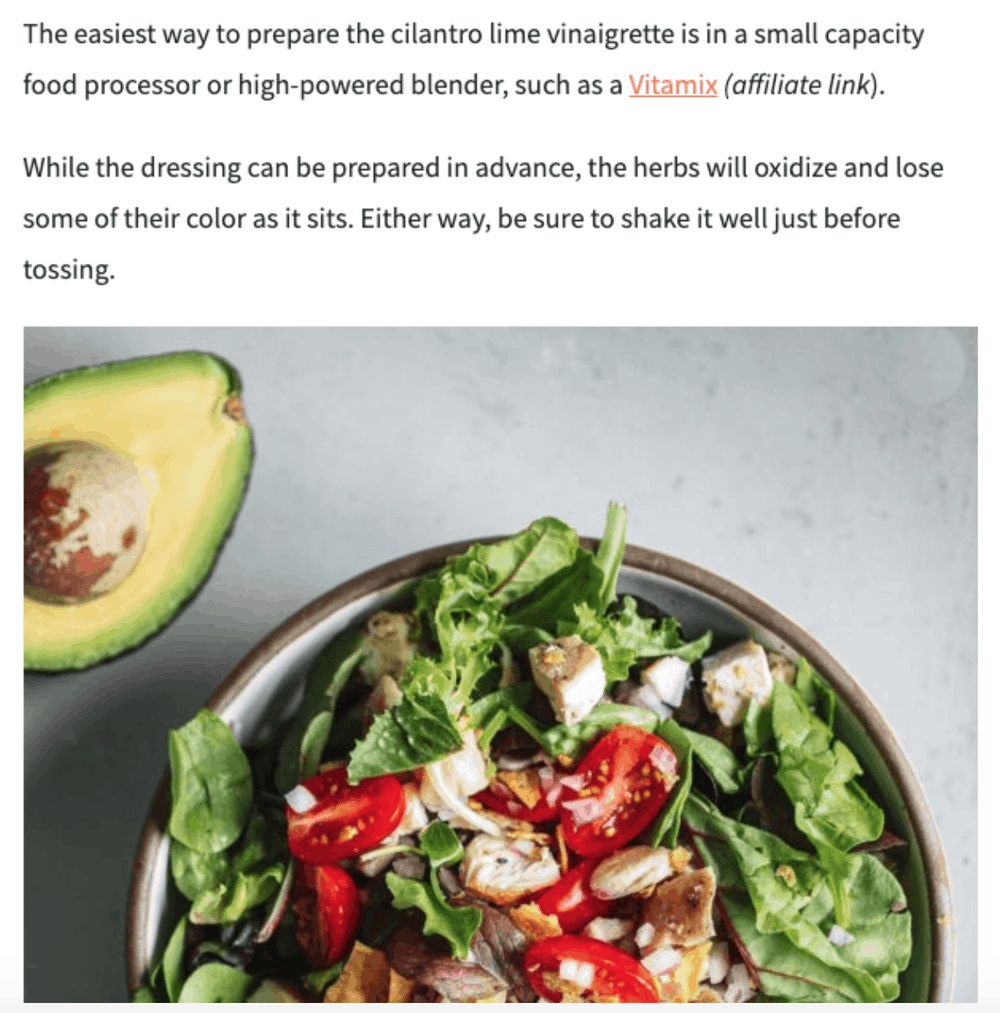
The benefits of a post like this are really two-fold, much like in digital PR (more on that in a minute). One, you get the product exposure from a high traffic website and a review from a respected chef. And two, you get what’s called an external backlink from an authoritative, relevant source that helps with search engine optimization (SEO).
So if you’re struggling to find a way to boost your food and beverage sales, try blogging influencers. If you sell alcoholic beverages, make sure you are familiar with current alcohol advertising restrictions before partnering with bloggers.
Can’t find the right one? Check out Influence.co’s list of the best in the industry.
4. Get published in online publications to improve your backlink profile
Reaching out to online publications to publish informative articles might not sound like it could help your food or beverage business, but it certainly can.
In fact, there are two basic benefits of publishing articles on online food publications. First, you get exposure in an authoritative, trusted medium, which improves brand awareness. And second, you gain external backlinks which boost your website’s domain authority, improving your search engine rankings for target keywords.
The process is called digital PR, and it’s a key component of any effective SEO strategy.
Just remember, the articles you are looking to secure here aren’t meant to be promotional. Instead, the goal is to share valuable informative content with your community that helps establish your food and beverage brand as an authority and improve your position in search engines.
For example, an artisan, organic peanut butter could reach out to an online food magazine offering to contribute an article about the use of palm oil in the nut butter industry.
Benefits to the website include:
- Free expert content for their readers
Benefits to the peanut butter company include:
- A link back to their website to improve SEO
- Positioning as an industry expert
- Referral traffic
- Brand awareness
5. Use free SEO tools from Google to improve your online presence
Online beverage sales are expected to make up 15 to 20% of the food and beverage industry’s overall sales in the US by 2025. If you want to secure those online customers without relying on paid advertising, you’re going to need SEO.
Search engine optimization, or SEO, is the process of increasing a website’s visibility on search engines. It combines content marketing, digital PR, technical SEO, keyword research, local SEO, and more to increase organic traffic and convert that traffic into paying customers.
Considering online food & beverage sales are growing by 21% each year, having a top position on search engines for target keywords is critical.

Thankfully, there are plenty of free SEO tools to help you get started doing just that.
Google Search Console
From optimizing your site’s content to alerts that inform you of site indexing issues, Google Search Console does it all.
The free tool from Google is a necessity for every website. For food & beverage companies, in particular, having a modern online presence is critical and Google Search Console helps you keep track of metrics for traffic and technical issues.
- Submit sitemaps and unique URLs for search engines to crawl.
- See which queries draw visitors to your site.
- Analyze your site’s impressions, clicks, and position on Google Search results pages.
- Verify your website’s ownership.
- Optimize and enhance your ‘rich results’ to secure rich snippets.
Google Analytics
It’s difficult to know if your marketing efforts are really paying off without tracking relevant KPIs. Google’s free analytics tool allows you to monitor the performance of your marketing efforts, product sales, and more.
Conversion reports, customer behavior reports, mobile app visitor reports, Google analytics produces tons of useful data.
Take for example the ability to target ‘remarketing audiences’. According to Google, a remarketing audience is “is a list of cookies or mobile-advertising IDs that represents a group of users you want to re-engage because of their likelihood to convert.”
Essentially Google tracks audiences that are looking at products and services similar to yours on mobile devices and on their computers using cookies so you can target these specific users with your marketing efforts or advertising.
If all of this is starting to sound a little out of your depths, you can always hire Technical SEO services to take over. Technical SEO will handle all nitty-gritty technical aspects behind your website’s visibility on search engines like Google
6. Start content marketing with a blog to bring in organic traffic
Content marketing is all about creating new pages that target unique, valuable keywords and topics that interest your customers. If you can create quality content that related directly to your audience, you can create great brand affinity and increase sales
Bohana, a company recently featured on ABC’s Shark Tank, is the perfect example. The company sells popped water lily seeds and recently had Kevin O’Leary invest $200,000 in their product.
Why did he do it?
Well, one of the reasons could be Bohana’s beautiful blog and consistent on-brand marketing efforts.
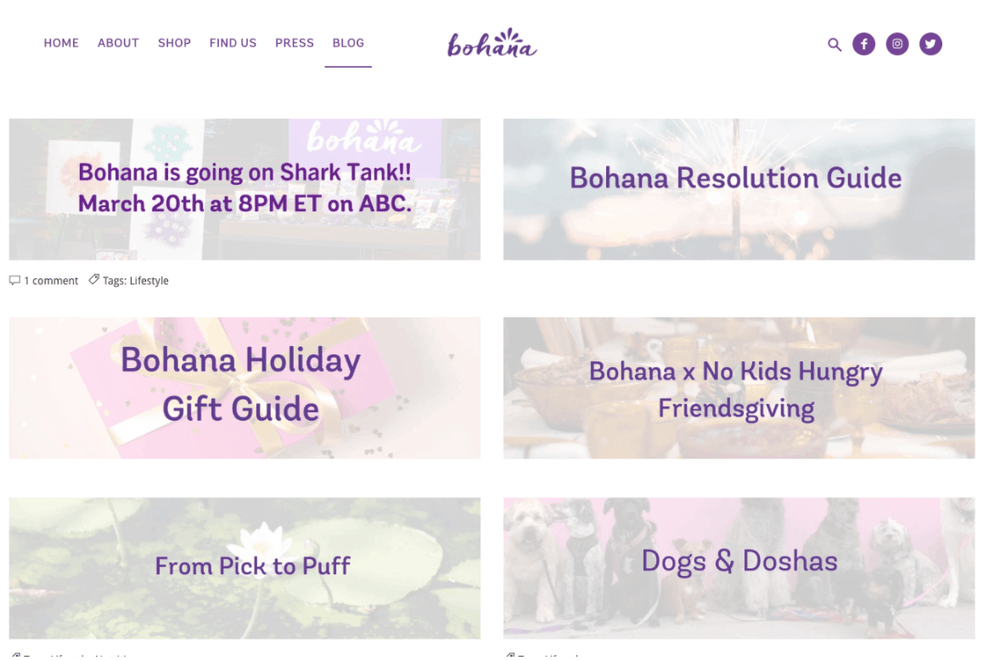
Bohana’s blog features everything from recipes with their product to articles that address their ideal customer profile directly like this one on “Hot Girl Summer Mindset”.
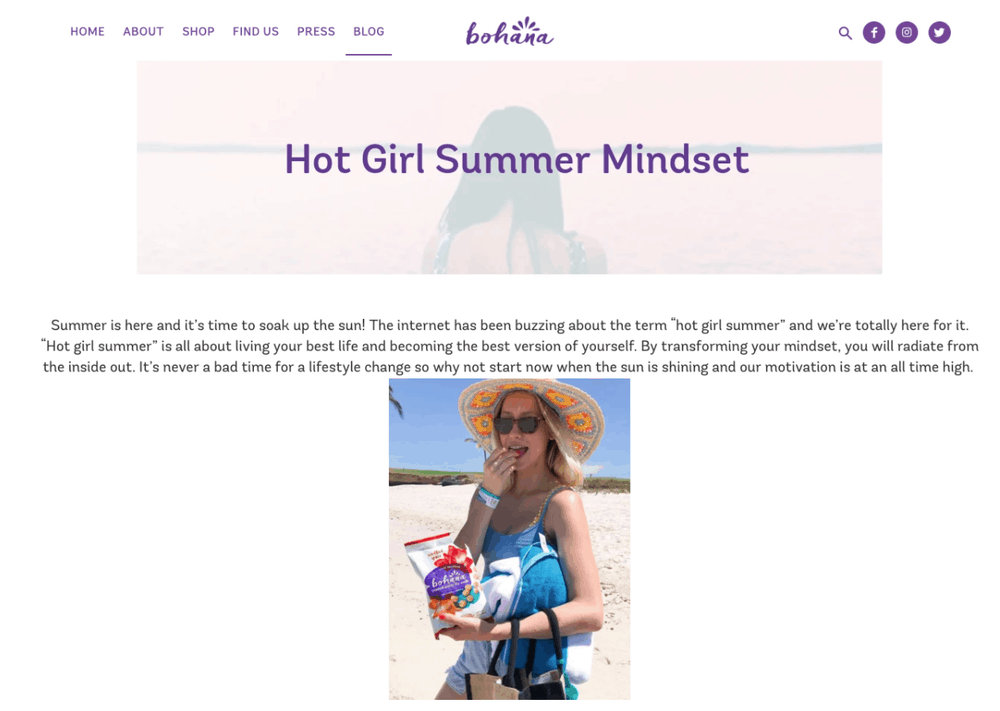
Having a stellar food blog helps you connect with your customers on a more personal level, and it helps improve your ranking in search engines for important queries. And that means more sales.
Too many delicious marketing ideas, too little time
When it comes to marketing a food or beverage company, you have plenty of options, but sometimes the time restraints of running a business make effective marketing impossible. Hiring your own in-house marketing team sounds great, but it’s often too expensive.
Thankfully, you can always reach out to SEO experts who will save you time and money. If you’re ready to get started on marketing contact us today for more information.
Markitors is a digital marketing agency specializing in SEO. We help small businesses rank higher on Google to get more traffic to their websites and increase revenue. Explore what’s in our food and beverage SEO toolbox: audits and keyword research, digital PR, technical SEO, and local SEO.






